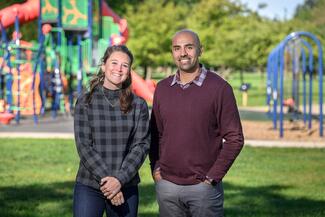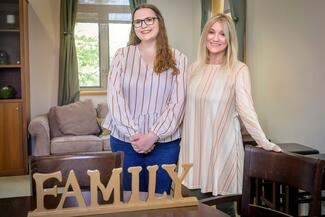
Skin-deep resilience: Hidden physical health costs for minority youth overcoming adversity
Jan. 4, 2024
When youth thrive despite difficult circumstances, they are usually lauded for their accomplishments. However, overcoming adversity may have a hidden physiological cost, especially for minority youth. A new study from Assistant Professor Allen Barton looks at physiological changes among high-striving minority youth in early adolescence—a time when youth are generally not yet manifesting clinical or subclinical symptoms.

Parentification: The impact of children taking on parental roles in their family
December 6, 2023
We expect parents to always take care of their children’s physical and emotional needs. But sometimes the roles are reversed, and the child assumes responsibilities beyond what is appropriate for their age – a phenomenon known as parentification.

Mindfulness programs help minoritized youth develop healthy coping skills, study shows
Sep. 26, 2023
Educational programs that promote mental and physical health can help young people – particularly in environments of chronic stress and trauma exposure – learn healthy coping strategies, avoid risky behaviors, and succeed in school. A new study from the University of Illinois Urbana-Champaign shows that a school-based mindfulness program is beneficial for Black high school students in urban communities.

Study explores challenges, opportunities of community participatory research
July 31, 2023
Community-based participatory research (CBPR) is an approach that connects academic researchers with community partners to inform project development. Where traditional research is often done “to” people, treating them as subjects with no agency, CBPR is a cooperative process incorporating the knowledge and direction of community members. A new study from the University of Illinois Urbana-Champaign and collaborators explores CBPR implementation in a project on criminal justice reform in Cincinnati.

Implementation of school-based wellbeing programs benefits from multiple voices
March 24, 2023
Health and wellbeing education can be an important addition to a school curriculum. But for these programs to be effective, they must be delivered in a way that works for everyone, including students, instructors, and school administrators. A new study from University of Illinois evaluates the implementation of two prevention programs, using a mixed-methods approach with input from multiple sources.

More Physical Activity, Less screen Time Linked to Better Executive Function in Toddlers, Study Finds
Oct. 1, 2022
Toddlers who spend less than 60 minutes looking at screens or engaging in more than 60 minutes of exercise per day tend to have better executive function than toddlers who do not meet these guidelines, according to a study involving participants from FRC's STRONG Kids 2 cohort.

Participatory Research Study Centers on What Safety is and How it Can be Equally Accessible
Sept. 30, 2022
In collaboration with community and academic co-researchers, a new study co-written by FRC Director Jacinda Dariotis explores (1) how community members define safety and (2) how can safety be made equally accessible? As part of a larger project co-designed by community members and academic researchers, the “Reclaiming Safety” paper is the first known interdisciplinary, community-based participatory research study to center community co-researchers in capacity building, data collection, interpretation, analysis, and dissemination on the topic of public safety.

Study Captures Insights on Nutritional Needs of Children in Child Care
Sept. 14, 2022
Child care providers face many challenges in implementing and integrating nutrition best practices for the children in their care, according to a study led by FRC researchers Brenda Koester and Stephanie Sloane. The study, also conducted by researchers Sarah Chusid and Janna Simon, found that organizations such as the Child and Adult Care Food Program help subsidize the cost of nutritious food and help child care providers reduce picky eating.

Poor Diet, Household Chaos May Impair Young Children's Cognitive Skills
July 12, 2022
Analyses of data on hundreds of young children suggested that regular consumption of sugary snacks and other unhealthy food, coupled with chaotic living environments, may impair children’s development of executive function skills. Graduate student Samantha Iwinski and Kelly Bost, a professor of human development and family studies, were co-authors of the study. Bost and Iwinski co-wrote the paper with U. of I. faculty members Sharon M. Donovan, the professor and Melissa M. Noel Endowed Chair of Nutrition and Health; and Barbara H. Fiese, the co-director of the STRONG Kids2 project and a professor emerita of human development and family studies.

Study by FRC Scholar Monitors Food, Beverage Offerings by Parents During COVID-19
May 10, 2022
A study by Jennifer M. Barton, a postdoctoral research associate at FRC, documented patterns of and variations in food and beverage offerings at dinner by parents of preschoolers during the COVID-19 pandemic across 10 days. Her findings showed that less than 50% of parents offered the recommended serving size of vegetables and proteins for each group, though on average, parents offered these types of food most often during the study's 10-day span.

Oncology Dietitians Rarely Ask Cancer Patients About Food Insecurity, Study Finds
Feb. 11, 2022
Although studies suggest that many cancer patients experience food insecurity, few oncology dietitians routinely ask them if they are having problems affording or obtaining food, according to research.